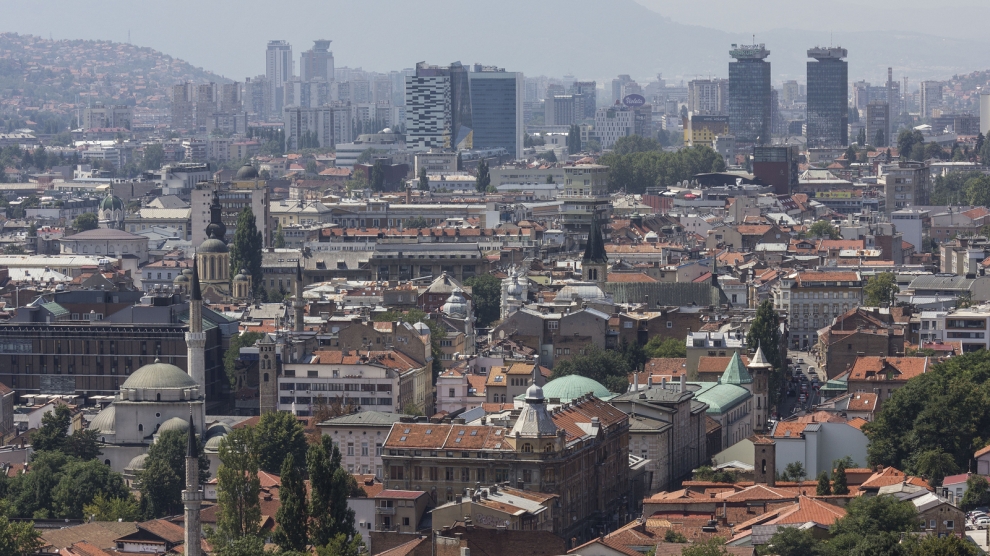Bosnia and Herzegovina will hold its eighth post-war general election on October 7. All Bosnian elected institutions, at three different levels: state, entity and canton, as well as the autonomous Brčko District, are up for re-election.
These include the three-person state presidency, the central state parliament and the two entity parliaments, as well as the Brčko District assembly and the presidency of Republika Srpska (RS), the predominantly Serb entity. The presidency is the country’s collective head of state and each of the three members represents one of the country’s constituent peoples: Bosniaks, Serbs and Croats. The Bosniak and Croat members are elected by voters in the Federation of Bosnia and Herzegovina (FBiH) entity and the Serb member is elected by voters in RS. Each is elected for four years and the chairmanship rotates between them every eight months, beginning with whoever received the most votes in the election. There are six candidates for the Bosniak seat, five for the Croat seat and four for the Serb seat.
The Croatian Democratic Union of Bosnia and Herzegovina (HDZ BiH), the main Bosnian Croat party, has released an Android application, called Community (Zajedništvo), designed to bring it closer to voters. The main opposition Bosnian Serb party, the Serbian Democratic Party (SDS), and its coalition partners in the Alliance for Victory, launched their campaign to challenge Milorad Dodik, the current President of RS. Founded in 1992 by Radovan Karadžić, the now-convicted war criminal, the SDS was the most popular Serb party in Bosnia until 2006, enjoying near-total domination of the political scene in RS. In the Bosniak camp, the Union for a Better Future for Bosnia (SBB), the second strongest Bosniak party, has released five slogans for the campaign, one of which stated: “Economy and not dynasty,” in reference to the main Bosniak Party of Democratic Action (SDA), and its leader, Bakir Izetbegović whose late father, Alija, is a former chairman of the Bosnian presidency. The SBB was formed in 2009 by Bosniak media and construction tycoon, Fahrudin Radončić, the founder and owner of Dnevni avaz, the largest daily newspaper in the country.
However, there is currently no legal basis for the election of a new House of Peoples in the FBiH, the entity’s upper chamber of parliament. In July 2017, the Bosnian Constitutional Court made several decisions likely to have a major impact on the country. The most important issue decided upon by the court relates to an appeal filed by Bosnian Croat politician Božo Ljubić in September 2016. Ljubić, who is the current President of the Supreme Council of the Croatian National Assembly, a political organisation of Croat political parties in Bosnia and Herzegovina, maintained that the electoral mechanism to establish the House of Peoples of FBiH violates the Bosnian constitution.
The Constitutional Court partially accepted this appeal back in December 2016 and gave the central state parliament six months to fix problematic parts of the election law. Parliament failed to amend the law, so the court decided to remove the problematic parts of the law itself. In doing so, the court removed the legal basis for establishing the House of Peoples in the FBiH, without which, governments cannot be formed on either a federal or state level, according to a Bosnian government official.
These general elections will be markedly different from previous ones. While constitutional issues were hotly contested before, this time most of the political parties are focusing on economic and social issues. In addition, the international community is now less engaged in Bosnia’s elections. It has previously sought to encourage Bosnia’s ethnic leaders to forge a consensus on how to reform the country’s complex and inefficient system of government.
What’s more is the role of foreign policy of neighbouring Croatia, who is increasingly advocating the creation a third, mainly Croat, entity, to supplement the existing Bosniak and Serb-dominated two. The “third entity” question is a key issue for HDZ BiH, the Bosnian wing of the Croatian Democratic Union (HDZ), the ruling party in Croatia. In her address to the European Parliament on 28 August 2018, Croatian MEP Željana Zovko of HDZ, stated that the final solution for Bosnia “should be found within the three communities … and not in the EU.”

